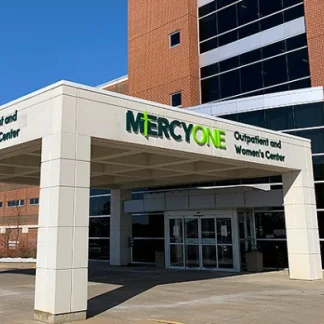Covenant Medical Center Horizons - Family Centered Recovery
Covenant Medical Center Horizons – Family Centered Recovery is a private rehab l...
MercyOne Horizons is a drug and alcohol rehab and medical facility located in Waterloo, IA. They provide inpatient and outpatient addiction treatment and mental health care.
This facility offers medical detox, inpatient addiction treatment, an intensive outpatient program, and co-occurring disorder treatment.
This program is highly structured and provides 24-hour medical care. Treatment begins with a comprehensive evaluation and medical detox where individuals are treated with FDA-approved medications to reduce withdrawal symptoms.
There are intensive outpatient programs that meet during the day or in the evenings. These structured groups and activities help participants explore their addictive behaviors and their consequences. Specialized outpatient programs are available for people with co-occurring mental health issues like depression, anxiety, PTSD, and schizophrenia, and for individuals who have a history of relapse. The relapse support group focuses on identifying relapse warning signs, developing management strategies, and gaining education on the phases of relapse.
Contact us for more information: (319) 272-2650

Connect with Horizons Family Recovery by calling their admissions team directly.
(319) 272-2650 Website Get DirectionsAt Horizons, they know family involvement is crucial for long-term recovery. Family members have been affected by the patient’s illness and need to be involved in the treatment. Without this healing of the family, there may be little support for the recovering patient, a factor critical for long-term success. Horizons involves the family through family education and awareness. Families learn about the illness of their loved one and are invited to attend segments of the treatment process with the patient. Sessions are held for family members and concerned parties that include education about chemical dependency and insights from recovering individuals.
Group therapy is any therapeutic work that happens in a group (not one-on-one). There are a number of different group therapy modalities, including support groups, experiential therapy, psycho-education, and more. Group therapy involves treatment as well as processing interaction between group members.
In individual therapy, a patient meets one-on-one with a trained psychologist or counselor. Therapy is a pivotal part of effective substance abuse treatment, as it often covers root causes of addiction, including challenges faced by the patient in their social, family, and work/school life.
Group therapy is any therapeutic work that happens in a group (not one-on-one). There are a number of different group therapy modalities, including support groups, experiential therapy, psycho-education, and more. Group therapy involves treatment as well as processing interaction between group members.
In individual therapy, a patient meets one-on-one with a trained psychologist or counselor. Therapy is a pivotal part of effective substance abuse treatment, as it often covers root causes of addiction, including challenges faced by the patient in their social, family, and work/school life.
In individual therapy, a patient meets one-on-one with a trained psychologist or counselor. Therapy is a pivotal part of effective substance abuse treatment, as it often covers root causes of addiction, including challenges faced by the patient in their social, family, and work/school life.
Covenant Medical Center Horizons – Family Centered Recovery is a private rehab l...
UnityPoint Health - Allen Hospital EAP is an outpatient rehab located in Waterlo...
Quakerdale of Waterloo is a private rehab located in Waterloo, Iowa. Quakerdale ...
Hope Haven – Waterloo is a private rehab located in Waterloo, Iowa. Hope Haven –...